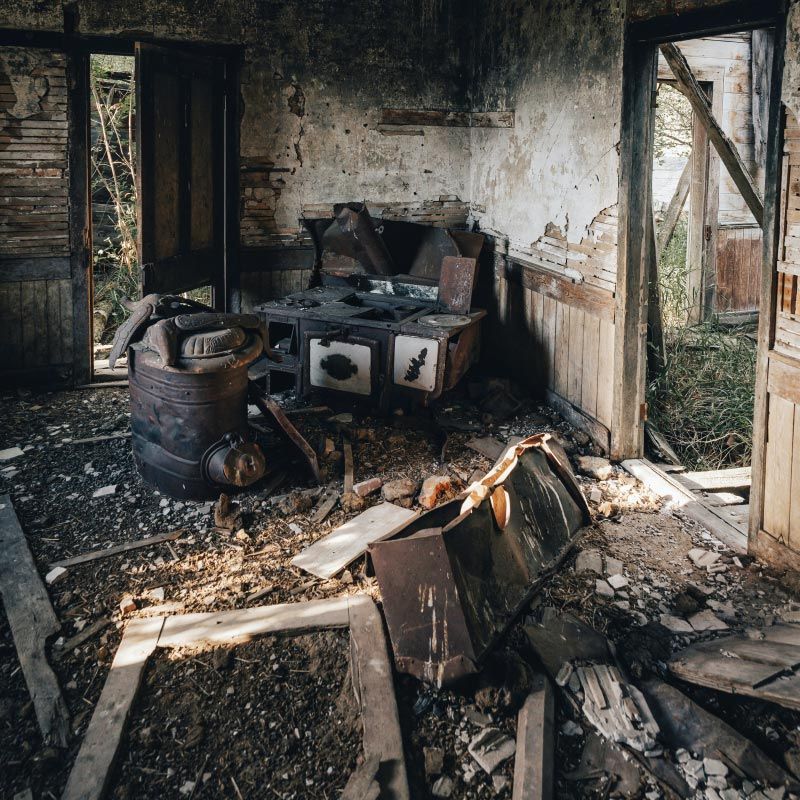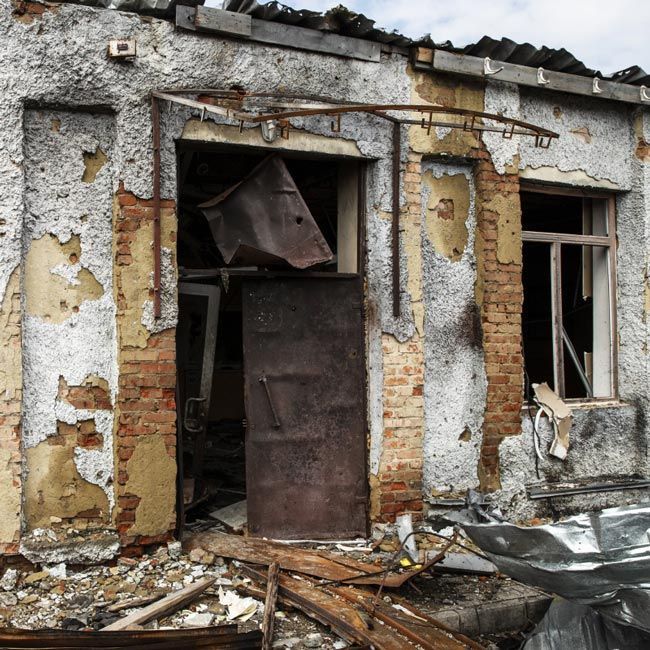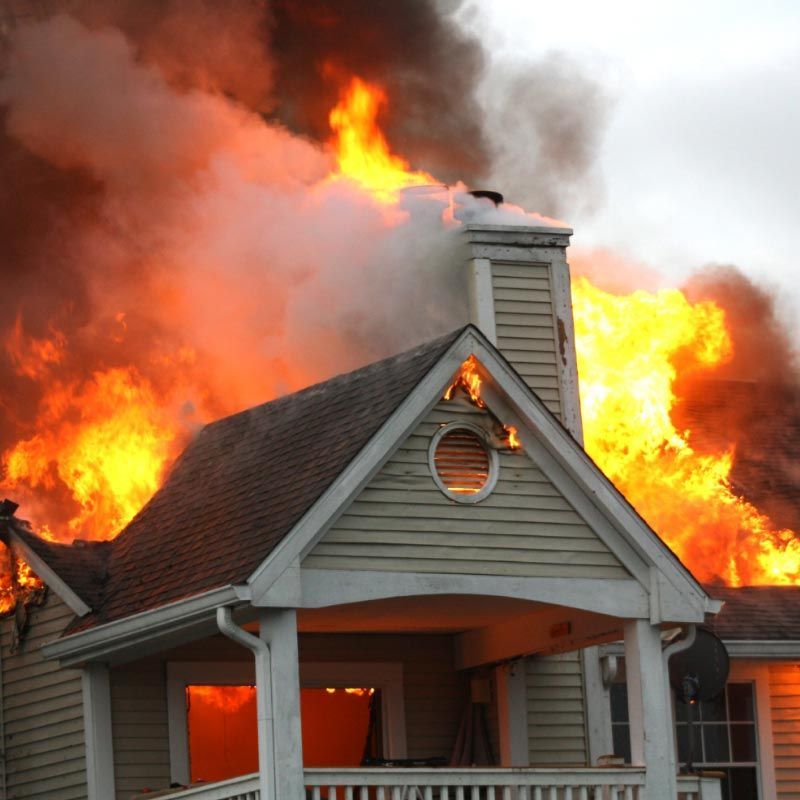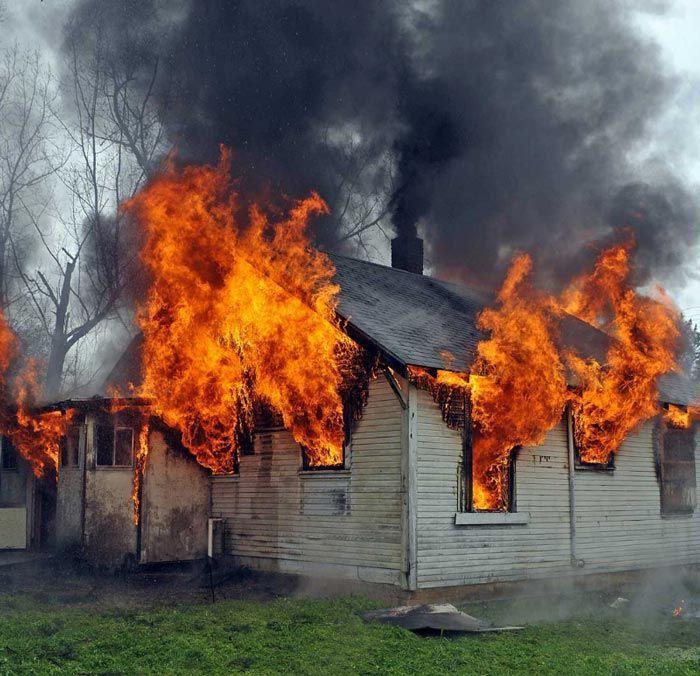Tips for Dealing With an Insurance Adjuster After a House Fire
Free Offer Form
We will get back to you as soon as possible.
Please try again later.
Selling a fire damaged house is possible, though may be difficult with a real estate agent. Selling as-is to a National cash buyer is one of the best options. Fill out the form below to get started and find out what your property is worth.
Dealing with a home insurance adjuster (or insurance agent) after a house fire can be an overwhelming and emotionally draining experience. However, it's crucial to rebuild your life and personal property.
When you file a fire insurance claim, adjusters will evaluate the damages caused by the incident and determine the compensation you're entitled to receive.
Skilled adjusters are crucial in handling fire insurance claims, ensuring fairness and efficiency, and they can impact the outcome of your claim.
This brief guide will discuss the essential role of an insurance adjuster following a house fire. It will also emphasize the importance of being prepared and provide a concise overview of the claims process.
Initial Steps for Dealing with Insurance Adjuster After a House Fire
Learn how to initiate the process effectively and ensure a smoother homeowners insurance claim resolution.
Filing Your Claim: The First Interaction with the Adjuster
After a house fire, contact your insurance company's adjuster, review your homeowners' policy, and document the fire damage. Get permission from the fire department before you proceed.
You'll be asked to file a "proof of loss claim." You can get your claim number by calling your property insurance agent. Review your insurance coverage before the insurance adjuster arrives.
Ask for an advance against your insurance claim, typically paid against the "Personal Property or Contents Coverage," to cover basic necessities and daily living expenses for relocation.
Keep receipts for mitigation efforts and avoid permanent repairs until you've consulted a fire insurance adjuster. Keep clear contact records, and consider hiring a public adjuster or attorney if you're overwhelmed.
Insurers typically hire independent adjusters to investigate fire insurance claims.
Public adjusters are knowledgeable, understanding professionals. Public adjusters are often trained to minimize the compensation you receive for your home insurance claim.
If fire or smoke damage renders your home unusable, ask your homeowners' insurance carrier about obtaining an advance for additional living expenses (ALE).
Many individuals are unaware that additional living expenses or "loss of use" can be claimed and covered.
Most insurance companies must be promptly notified of any insurance claims.
Documenting Your Losses: Keeping Meticulous Records
Documenting personal property loss after house fires will make your fire insurance claim likelier to succeed.
Check for hidden damage. Document the damages and inventory all items like damaged personal property. Ensure your record shows the quantity, description, age, and Replacement Cost Value (RCV) of all items.
Maintain a log of interactions with insurance companies. Securely organize records and consult professionals on addressing specific losses or high-value personal items.
Keep all phone calls, correspondences, estimates, bills, permits, and repair contracts in one place using a three-ring binder.
If you delay notifying your insurance companies, your insurance company may send an adjuster late.
Knowing Your Rights: Reading Through Your Insurance Policy
Understanding the homeowners' insurance policy is crucial when you deal with an insurance adjuster or agent after a house fire. Insurance policies often require that you "mitigate damages."
It should cover various losses, detailed deductibles, perils, personal injury, endorsements, policy conditions, fire damage claim procedures, and deadlines.
Policyholders should cooperate with the investigation, provide accurate information, and mitigate further damage. Consult an attorney if necessary.
If the fire resulted in a leaky roof or burst pipe, cover the affected area with a plastic sheet or cut off the water.
You may also want to install a temporary chain-link fence around your property and seal windows to prevent vandalism or theft.
Can I Sell a Fire Damaged House National?
Yes. You can sell a fire-damaged house. However, it may be harder to sell in the local National real estate market in as-is condition. You would have to make repairs and possibly rebuild most parts of your house before a buyer takes interest in the property. Your best option when selling a fire-damaged house is a cash buyer. They buy burned houses as-is so you don't need to spend money on repairs. They'll handle all the cleanups and renovations for you, however, expect that their offer may be below the cash value of your property.
Navigating Through the Insurance Claim Process
This section provides a broad overview of the homeowners' insurance process.
Understanding the Insurance Adjusters Role
A fire insurance adjuster is vital in assessing fire and smoke damage, determining liability, and negotiating a quick settlement with your fire insurance company.
They work with the policyholder to reach a final settlement amount.
Understanding their role is crucial for policyholders to manage expectations and avoid disputes.
Deciphering Policy Terminology: Common Terms You Should Be Aware Of
The process involves understanding terms found in your homeowners' insurance like policyholder, deductible, coverage limit, policy period, underwriting, claims adjuster, indemnification, subrogation, Actual Cash Value, and more.
This helps policyholders make informed decisions, communicate effectively with insurance companies, and receive adequate compensation based on their homeowners' insurance.
Meeting with the Adjuster: What to Expect
You'll meet with an insurance company adjuster from your insurance company to assess the fire damage, gather information, and initiate the insurance claims process.
The adjuster inspects the damaged personal property, documents fire damage, and may offer a settlement. Communicate clearly with them.
We recommend being transparent with your insurance adjuster following a house fire to get more money for reimbursement from the insurance company.
How to Deal with Insurance Adjuster After a House Fire
This segment offers guidance on communicating with insurance adjusters post-fire for a fair resolution.
Communication: How to Constructively Interact with Your Adjuster
Effective communication with your insurance adjuster is crucial for a fair claim resolution after a house fire.
Be prepared and maintain a calm demeanor. However, you should also be cooperative and ask questions and clarifications as needed. Be honest and maintain a professional tone at all times.
Consult with public adjusters or attorneys and be patient in pursuing a fair settlement. Skilled public adjusters are experienced in understanding the complexity of insurance policies.
Negotiation: Fighting for Fair Valuation of Damages
Negotiating with home insurance adjusters or insurance agents from your homeowners' insurance company after a house fire is crucial for a fair property damage evaluation.
Seek estimates from reputable professionals and be prepared to provide evidence as needed.
Disputes: What to Do When You Can't Agree
When you disagree on the settlement amount or the terms of your claim, it's time to protect your interests and work toward a resolution.
Review your insurance policy thoroughly to understand your rights and obligations.
If you cannot agree with the adjuster, consider requesting a review by their supervisor or manager within the insurance company. Explain your concerns and provide evidence to support your position.
The Process of Selling Fire Damaged Property to a Cash Buyer
The process of getting a cash offer for a burned house is pretty much the same as any property type. However, it is best if you can contact your home insurance company first before getting an offer for your house after a fire. Your National home insurance company can help assess the extent of the fire damage as well as the repair costs. This can help you decide whether selling a house as-is to a cash buyer is really the right path to take. Once you have decided that you really want to get a cash offer, here are the next steps you should take.
Important note: This doesn't apply to all cash buying companies.
1. Request a Cash Offer
You can easily find cash buyers in your National area by searching online. Once you found a reputable cash buyer, head over to their website to fill out a form or give them a call to ask for a cash offer. Most cash buyers and real estate investors give no-obligation cash offers so you can still ask other cash buying companies how much they can buy your fire-damaged property. If you are unsure about the background of a cash buyer, you can always ask them for proof of their source of funds.
2. Welcome the Cash Buyer into Your Home
The cash buyer or real estate investor may want to check your fire-damaged property for the repairs and improvements it needs, especially its roofing, walls, foundation, etc. You won't have to pay for these repairs when selling a National house to them, but experienced home buyers or real estate investors consider repair costs to make an accurate cash offer.
3. Review the Contract and Sign
Once you accept the cash buyer's offer on your fire-damaged home, they would furnish a sales contract and send it to you electronically. You will be given time to go over the terms and ask questions. After everything is settled, sign the contract to make the deal with the National cash home buyer official.
4. Closing
During closing, expect less paperwork since there are no lenders involved. After you have signed the minimal necessary paperwork and the National deed is transferred to the cash buyer's name, you'll get your cash in your bank account. If you aren't confident attending the closing by yourself, bring a real estate attorney with you.
5. Set Your Preferred Day to Move-Out
If the property has minor fire damage and you are still living in it, communicate to the cash home buyer when you want to move out. This is also a good time to ask for a sale-leaseback agreement if you don't have a place to crash on while you are still looking for a new National home.
Maximizing Your Insurance Claim After a House Fire
Maximizing your fire insurance claim will ensure you're in a better position to restore your property after the fire.
You'll discover various methods for a beneficial claim settlement to help you rebuild.
Ensuring All Damages are Covered
Maximizing your homeowners' insurance claim after a house fire involves ensuring that your home insurance policy covers all potential fire loss.
Engage experts to assess and estimate repairing or replacing damaged personal property costs.
Professional adjusters can support your claim and ensure all fire damages are covered. They are experts in assessing fire damage.
You can begin assessing fire damage restoration costs after reviewing your home insurance agreement and finalizing the necessary post-fire repairs.
Strategies to Argue for a Higher Claim Payout
Seek repair estimates from reputable contractors or professionals from your restoration company. Multiple estimates can give you a better idea of the payout you need for restoration.
Don't allow a restoration company to take or restore any damaged property until you've decided which items can be restored or need to be replaced.
You may jeopardize having enough in your final settlement to restore your house to its pre-loss condition.
If you have a replacement cost policy in your home insurance, it should reimburse you when replacing or repairing your home or personal property.
Before accepting any settlement offer, carefully review the terms and conditions to ensure they adequately cover your losses.
A settlement is generally considered final after being accepted, and you may waive your right to seek further compensation.
Legalities of Dealing with Insurance Adjusters
This segment explains fire insurance claims legalities.
Decoding Lawful Insurance Practices
Understanding your insurance is crucial for navigating the fire insurance claim process.
It includes understanding insurance regulations, the duty of good faith, unfair claim practices, policy terms, legal contracts, representation, the insurance commissioner's office, legal recourse, the statute of limitations, and consultation.
Policyholders have legal obligations with regard to paying insurance premiums, complying with policy terms, seeking legal representation, and understanding the statute of limitations.
Reporting Unlawful Adjuster Behavior
If you suspect a home insurance adjuster from your homeowners' insurance company is engaging in unlawful practices, it's crucial to document the details.
Consider contacting the insurance company's customer service department or claims supervisor.
If you haven't heard from them, write to your insurance company, and consider sending a copy to your state's Department of Insurance.
In cases where the insurance company doesn't address your concerns adequately, you can file a complaint with your state's insurance commissioner's office.
Hiring Professional Help
The segment underscores the importance of seeking professional assistance for complex legal matters, financial difficulties, or insurance claims.
When to Bring in a Public Adjuster
A public adjuster's expertise can be invaluable when your fire insurance claim involves intricate issues, extensive fire damages, or multiple losses.
If you encounter disputes or disagreements with your insurance company regarding the replacement value or coverage, public adjusters can help negotiate a fair resolution.
When you have limited time to manage the process, such as after a disaster, public adjusters can handle the extensive documentation and negotiations on your behalf.
Working with a Lawyer to Fight for Your Rights
You might consider working with an attorney in various situations. When you face challenges with your fire insurance claim, including coverage disputes, denied claims, or bad faith practices by the insurer.
Working with an attorney can provide the legal expertise and representation needed to protect your rights and achieve your desired outcomes.
Frequently Asked Questions
Read this section for more info on the involvement of legal professionals, financial advisors, public adjusters, and other experts.
How Long Does It Take To Settle an Insurance Claim After a House Fire?
The time it takes for your insurance company to settle a fire insurance claim after a house fire can vary.
The duration of a claim can range from weeks to months, depending on the complexity of the claim, the extent of the fire damage, and the efficiency of communication.
What Should I Not Say to an Insurance Adjuster?
When you deal with an insurance adjuster from your insurance company, it's important not to:
- Admit fault or liability.
- Speculate or guess about details.
- Provide a recorded statement without legal advice.
- Accept blame for the incident.
- Offer unnecessary personal information.
- Agree to a settlement without reviewing it thoroughly.
- Sign any documents without understanding their implications.
- Make statements that could be taken out of context or misinterpreted.
How Do I Receive the Payout After Settling My Claim?
After settling your insurance claim, you typically receive the payout via check or electronic transfer to your bank account.
The specific method and timeline for receiving the funds will depend on your insurance company's procedures and your preferences.
Understanding the house fire insurance payout process is crucial for policyholders to ensure they receive their settlement funds after settling their fire damage claims.
What if My Insurance Adjuster Is Not Responsive?
If your insurance adjuster from is unresponsive, consider taking the following reasonable steps:
- Document Attempts: Keep records of your attempts to contact the insurance adjuster.
- Contact Their Supervisor: Contact the insurance company's adjuster's supervisor or manager.
- File a Complaint: If necessary, file a complaint with your state's insurance regulatory authority.
- Consult an Attorney: Speak with an attorney specializing in fire claims for guidance.
- Seek a Public Adjuster: In some cases, hiring a public insurance adjuster can help facilitate communication with the insurance company.
Can I Dispute My Insurance Adjuster's Report?
Yes, you can dispute your insurance adjuster's report. You can challenge their findings and provide additional evidence to support your fire claim.
Conclusion
Going through the complexities of dealing with an insurance adjuster after a house fire requires a well-informed and systematic approach.
Documenting fire losses, understanding your policy, effectively communicating, negotiating, and disputing outcomes requires attention to detail and a commitment to protecting your own interests.
While the relationship between policyholders and insurance adjusters can sometimes be challenging, it is essential to remember that your insurance policy is a binding contract.
It's crucial to gather knowledge, maintain records, and seek professional help to recover from a house fire and secure a fair settlement.
Understanding the Process, Knowing Your Rights, and Protecting Your Interests
When dealing with the aftermath of a fire, it's important to completely understand the process.
To ensure that your insurance company fulfills its obligations and provides you with the necessary compensation, it is advisable to keep detailed records, understand your rights, and stay informed.
Doing so means you're taking the necessary steps to protect your interests and work towards a positive outcome.
National Resources
- Selling a Fire Damaged House National
- Selling Inherited Property National
- Selling a House in Probate National
- How to Sell a House by Owner National
- How to Sell Rental Property National
- Stop Foreclosure National
- Selling a House during Divorce National
- How to Sell a Hoarder House National
- Can You Sell a Condemned House National?
- Can You Sell a House in Foreclosure National?
- How to Sell Rental Property with Tenants National
- Taxes on Selling a House National
Free Offer Form
We will get back to you as soon as possible.
Please try again later.
Author: Chris Charles
We buy fire damaged houses because we like taking on the challenge and making a win win for sellers looking to sell. We work with our partners nationwide and are experienced in dealing with the city if its already been condemned. Request a cash offer to have a chat with us today.
Sell Fire Damaged House for Cash Quick
Sell Your House Fast, To A Legitimate House Buying Company You Can Count On. ✔️ Free, Easy & ✔️ No Pressure Process. Find Out How We Buy Houses!
Sell Fire Damage House in California
Sell Fire Damaged House in Ohio
Sell Fire Damaged House In North Carolina
Sell Fire Damaged House In Michigan
Sell Fire Damaged House In Massachusetts
Sell Fire Damaged House In Colorado
Sell Fire Damaged House In Minnesota
Sell Fire Damaged House In South Carolina
Sell Fire Damaged House In Alabama
Sell Fire Damaged House In Louisiana
Sell Fire Damaged House In New Hampshire
Sell Fire Damaged House In Maine
Sell Fire Damage House in Texas
Sell Fire Damaged House in Florida
Sell Fire Damaged House In New Jersey
Sell Fire Damaged House In Virginia
Sell Fire Damaged House In Indiana
Sell Fire Damaged House In Kentucky
Sell Fire Damaged House In Oregon
Sell Fire Damaged House In Oklahoma
Sell Fire Damaged House In Connecticut
Sell Fire Damaged House In Utah
Sell Fire Damaged House In Rhode Island
Sell Fire Damaged House In Delaware
Sell Fire Damaged House in Pennsylvania
Sell Fire Damaged House in New York
Sell Fire Damaged House In Washington
Sell Fire Damaged House In Arizona
Sell Fire Damaged House In Missouri
Sell Fire Damaged House In Nevada
Sell Fire Damaged House In Iowa
Sell Fire Damaged House In Arkansas
Sell Fire Damaged House In Mississippi
Sell Fire Damaged House In Kansas
Sell Fire Damaged House In North Dakota
Sell Fire Damaged House In Alaska
Sell Fire Damaged House in Georgia
Sell Fire Damaged House in Illinois
Sell Fire Damaged House In Tennessee
Sell Fire Damaged House In Maryland
Sell Fire Damaged House In Wisconsin
Sell Fire Damaged House In New Mexico
Sell Fire Damaged House In Idaho
Sell Fire Damaged House In Nebraska
Sell Fire Damaged House In West Virginia
Sell Fire Damaged House In Hawaii
Sell Fire Damaged House In Vermont






